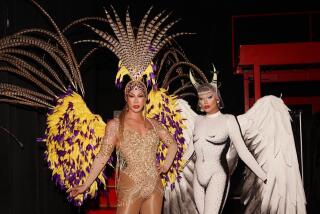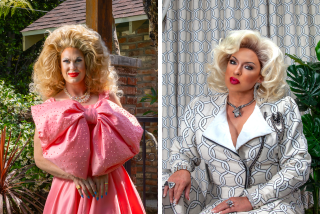Substitute Teacher : Long Free of Classroom Chaos, Hilda Gurney Trains Dressage Horses, Riders at Her Farm in Moorpark to Pay for Bid for 3rd Olympic Berth
- Share via
Olympic dressage rider Hilda Gurney spent 14 years as a special education teacher in the Los Angeles Unified School District. Today, she confines her teaching to horses, a much more enjoyable job, she says, because horses don’t talk back, they don’t get into fights, and they don’t fall asleep in class.
“Fourteen years was long enough,” said Gurney, a 48-year-old no-nonsense woman. “I love what I’m doing now.”
What Gurney does is run Keenridge Farm, a 10-acre horse-training complex in Moorpark that provides her with the freedom and financial wherewithal to compete at the highest levels of international dressage.
Gurney, who clinched the team bronze medal for the United States in the 1976 Olympics and was the highest-placing U.S. dressage rider in the 1984 games, is a strong candidate to represent the United States this summer in Barcelona.
“Hilda is a very talented trainer and rider,” said Fiona Baan, director of dressage for the U.S. Equestrian team. “She has great determination and rides well under pressure.”
Gurney, a six-time national dressage champion, quit teaching school and built Keenridge in 1979, after the International Olympic Committee ruled that athletes could make money teaching their sport and still retain their amateur standing. Until then, only well-heeled riders could afford to devote full-time interest to dressage.
“Before the rule change, the middle class was killed,” Gurney said.
Gurney recently came in fourth in the USET dressage selection trials in Apopka, Fla. She rode Willy the Great, an 11-year-old Hanoverian gelding owned by Peggy and Parry Thomas of Sun Valley, Ida. A day after the competition, she and Willy flew back to L.A. on a cargo plane, arriving about sunrise.
Willy got to rest after the trip, eating alfalfa and oats in his stall at Keenridge, but for Gurney, it was business as usual.
With 60 horses on the premises and 100 students who drive to Moorpark from as far away as Palos Verdes, Gurney is like a ringmaster as she directs the action swirling around her. A typical day: Up at 4:30 a.m., ride at 5:30, teach from 10:30 to 6 p.m. She employs four men and two women, barking out orders on a small PA system.
“Manuel, get Lavinia ready,” she said into a mike while sitting on a bench under a tree and watching a rider put a horse through its paces in one of the two outdoor arenas on the farm. Voices rang out from beyond a row of shrubs. “OK, Hilda,” “Right away, Hilda.” Seconds later a woman ran up to her with an emergency: A horse was in shock, hemorrhaging.
“Call the vet!” Gurney said. Marching quickly to the stall, she attended to the horse but left the animal with her assistants, unable to watch it suffering. To Gurney, who is single, the horses are like her children.
“I love my horses,” said Gurney, who has been involved with them since her teen-age years in Woodland Hills. “I always had a knack with horses,” she said. “They were always willing to work for me. Usually, I can do what I want to do with them.”
When she was a young rider, Gurney’s specialty was eventing, which combines dressage, cross-country riding and show jumping. She won the national eventing championship in 1969, but the fact that eventing is very hard on the horse eventually got her out of the sport and into dressage.
Gurney made her reputation with Keen, an American thoroughbred, “a great horse,” Baan said, “a once-in-a-lifetime horse.” Gurney rode Keen in the ’76 Olympics and then retired him because of lameness but brought him back for the ’84 games.
“Keen was a hard horse to replace,” Baan said, “but Willy is a good one.”
Gurney and Willy are among the six U.S. horse-rider combinations going to Europe in May to participate in two competitions. The top four combinations from those competitions go to Barcelona.
Europeans have traditionally dominated dressage “because they have more knowledge available to them,” Gurney said. “Every town in Germany has a riding academy.”
But she feels that the United States will do well at the Olympics. “This year’s team will be very good,” Gurney said. “We have some really, really super horses.”
Most of the best U.S. riders are older than 40 because dressage is one of the few sports in which the participants get better as they get older.
“I’ve been around forever,” Gurney said, “but it takes a long time to get that many skills, which is why the sport is so fascinating.”
And a lot more fun than teaching school.
“I can’t think of a better way to spend my life,” Gurney said. “I have lots of excitement.”
More to Read
Go beyond the scoreboard
Get the latest on L.A.'s teams in the daily Sports Report newsletter.
You may occasionally receive promotional content from the Los Angeles Times.






